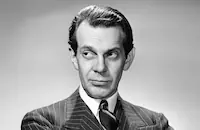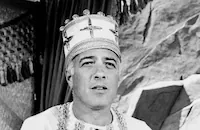The Fiercest Heart
Cast & Crew
George Sherman
Stuart Whitman
Juliet Prowse
Ken Scott
Raymond Massey
Geraldine Fitzgerald
Film Details
Technical Specs

Synopsis
In South Africa in 1837, three men--Steve Bates, a private in the British Army; Nzobo, his African friend; and Harry Carter, a convicted criminal--break out of a prison garrison and join a group of Boers, led by Willem Prinsloo, who are heading north to escape from British oppression. Almost immediately, Bates becomes attracted to Willem's granddaughter, Francina; and despite her engagement to a young farmer, Barent Beyer, he openly woos her. Following a Zulu raid in which Willem is wounded, Carter assaults Francina and is banished from the company. A short time later, after naming Bates as his successor, Willem dies. The wildly jealous Barent tries to kill his rival, but before he can do so he himself is killed by a Zulu spear. Meanwhile, Carter has joined forces with a brutal slave trader who, with the aid of the Zulus, plans to attack the Boers and steal their wagons. But the raid fails when Bates kills Carter in a hand-to-hand fight and Nzobo slays the Zulu chief. A few days later the Boers reach their destination, and Bates decides to become a farmer and settle down with Francina.

Director
George Sherman
Cast
Stuart Whitman
Juliet Prowse
Ken Scott

Raymond Massey

Geraldine Fitzgerald
Rafer Johnson
Michael David

Eduard Franz
Rachel Stephens
Dennis Holmes

Edward Platt
Alan Caillou
Hari Rhodes
Katherine Henryk
Oscar Beregi
Crew
Jack R. Berne
Richard Billings
Alfred Bruzlin
Ellis W. Carter
Duncan Cramer
Warren B. Delaplain
Roy Fitzell
Irving Gertz
Edmund H. North
Ben Nye
Edward B. Powell
Stuart A. Reiss
Walter M. Scott
George Sherman
Helen Turpin
George Van Marter

Film Details
Technical Specs

Articles
Geraldine Fitzgerald (1913-2005)
Born in Dublin on November 24, 1913, Fitzgerald was educated for a time in a convent school in London. Back in her native Dublin, she happily accompanied her aunt, the Irish actress Shelah Richards, to a theater one afternoon when the director mistook her for an actress, and instructed her "to go backstage and change." An inauspicious start, but it gave her the acting bug. She made her stage debut in 1932 in Dublin's Gate Theater and later appeared in a few forgettable British films: Open All Night (1934), The Ace of Spades, Three Witnesses (both 1935). She made the trip across the Atlantic in 1938 to act with Orson Welles and his Mercury Theater, but agents from Warner Bros. quickly signed her and she was soon off to Hollywood.
She made her film debut in 1939 supporting Bette Davis in Dark Victory, but it was her performance in a second film later in the year that proved to be the most memorable of her career - the role of Isabella Linton in Wuthering Heights. She earned an Oscar® nomination for her turn and stardom should have been around the corner, but Fitzgerald's feuding with studio head Jack Warner (he refused to let her return to the New York stage and she would refuse parts that she thought were inferior) led to some lengthy suspensions of unemployment. Irregardless, Fitzgerald still had some shining moments at Warner Bros. the heady melodrama The Gay Sisters (1942); the superb espionage thriller Watch on the Rhine (1943); Robert Siodmak's terrific, noirish thriller The Strange Affair of Uncle Harry (1945); and a tough crime drama where she played opposite John Garfield Nobody Lives Forever (1946).
Fitzgerald returned to New York by the '50s, and found much work in many of the live television dramas that were so popular in the day: Goodyear Television Playhouse, Lux Video Theatre, Studio One, Schlitz Playhouse of Stars; and even some taped television shows: Naked City, Alfred Hitchcock Presents in between her stage demands.
She did return to the screen by the mid-'60s and proved herself a fine character actress in films like The Pawnbroker (1965); Rachel, Rachel (1968); Harry and Tonto (1974); a wonderfully memorable comic turn as Dudley Moore's feisty grandmother in Arthur (1981); and yet another noteworthy performance as Rose Kennedy in the acclaimed mini-series Kennedy (1983). She also appeared in a few television programs: St. Elswhere, Cagney & Lacey, and The Golden Girls before ill-health forced her to retire by the early '90s. Among the relatives that survive her are her son, director Michael Lindsay-Hogg (Brideshead Revisited; a daughter, Susan Scheftel; and her great-niece, the English actress Tara Fitzgerald.
by Michael "Mitch" Toole

Geraldine Fitzgerald (1913-2005)
Quotes
Trivia
Miscellaneous Notes
Released in United States Spring April 1961
CinemaScope
Released in United States Spring April 1961













